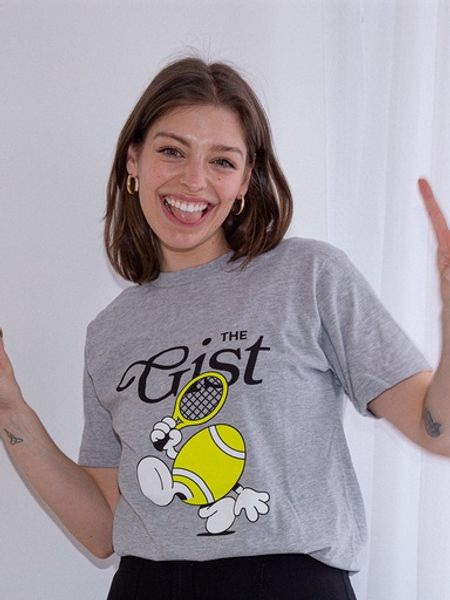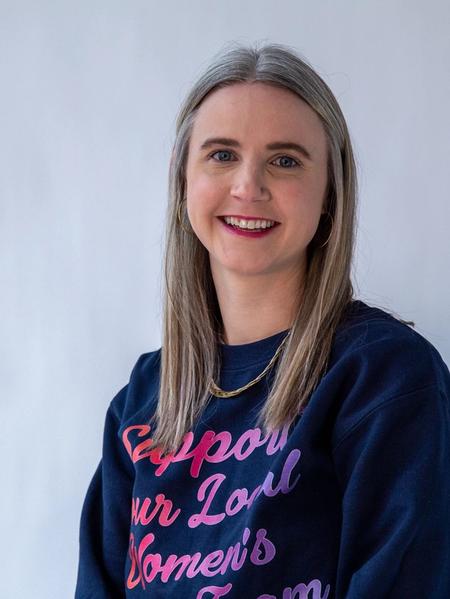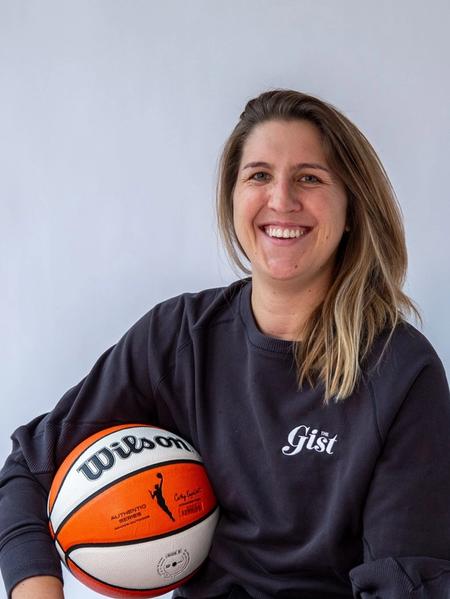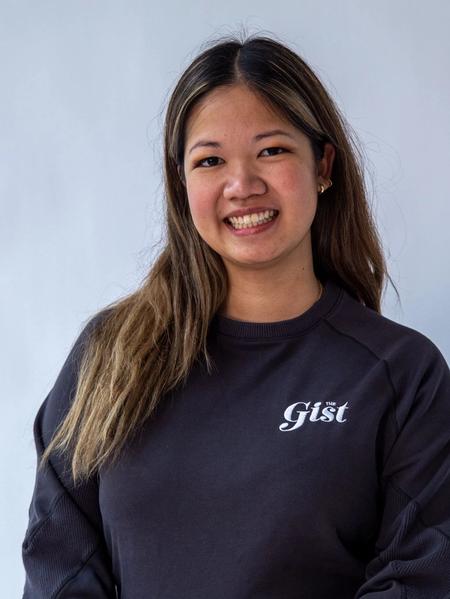
 The GIST is a fan-first sports media brand that's shaking up the male-dominated sports industry. We're reinventing the dialogue around sports by providing equal coverage to women's and men's sports. Whether you catch our newsletter, podcast, or social posts — our fun, digestible content is for all types of fans.
The GIST is a fan-first sports media brand that's shaking up the male-dominated sports industry. We're reinventing the dialogue around sports by providing equal coverage to women's and men's sports. Whether you catch our newsletter, podcast, or social posts — our fun, digestible content is for all types of fans.

WHO WE ARE
We don’t just keep pace, we’re ahead of the game. Fan-first content goes beyond the highlights, addressing new subjects and perspectives that have often been ignored. We’re looking at the sports landscape through a wider lens that acknowledges its full cultural impact.
Our community is what drives us. GISTers are not just sports fans, they’re here for what sports can be — an inclusive and empowering community made for everyone. Aligned with our mission, they’re looking for progress, and that’s what we never stop striving for.
We keep our content straightforward and digestible. Not every topic in sports is light (looking at you, pay equity!), but speaking fan-to-fan means we're succinct and accessible, which is what our GISTers love most about us.
Launched in 2019 by three college friends — Jacie deHoop, Ellen Hyslop and Roslyn McLarty — The GIST is all about changing the game in the male-dominated sports industry where less than 15% of journalists are women and less than 5% of coverage is on female athletes and non-binary folks. Our 40-person team works day in and day out to change those stats.
WHAT WE DO
Think of us as your witty, sports-obsessed best friend. We’re a multimedia destination that's made by and for sports fans who don’t fit (or maybe don’t want to fit) the traditional avid sports fan mold. We connect with our growing community of 1 million GISTers through our:
Newsletters
- Get "the gist" of what's going on in the sports world in less than 5 minutes every Monday, Wednesday, Friday and Sunday morning in our localized 4x-weekly sports newsletter.
- Interested in the business of women's sports? Try our 3x-weekly sports biz newsletter.
Podcast, The GIST of It
- Twice a week hosts Ellen Hyslop and Stephanie Rotz discuss current sports topics and how they intersect with pop culture and social issues, covering everything from season previews to calling out the sexist BS we see in sports daily. Expect a hilarious yet informative conversation with a refreshing female perspective on the world of sports.
Job Board
- We're helping women & non-binary folks find work in sports with our job board. All companies and roles are vetted by us, so you can trust that only the best organizations and opportunities will make the cut.
Daily social media
- Follow us on TikTok (@thegistsports), Instagram (@thegistusa, @thegistca) and Twitter (@thegistusa, @thegistca), to stay informed and entertained on the regular.
So, what do you get?
The team

Jacie deHoop (she/her)
Co-Founder

Ellen Hyslop (she/her)
Co-Founder

Roslyn McLarty (she/her)
Co-Founder & Strategic Advisor

Alexis (Lex) Allison (she/her)
Manager, Branded Content & Client Solutions

Jessica Aldos (she/her)
Senior Social Media Producer

Nadia Ayoub (she/her)
Senior Account Manager

McKenzie Bolden (she/her)
Senior Growth Marketer

Sara Buck (she/her)
Ringer - Fact Checker & Newsletter Operations

Monique Calero (She/Her)
Account Executive

Emmy Curtis (she/her)
Social Media Coordinator

Adrianne Dean (she/her)
Ringer - Editor & Fact Checker

Karissa Dzurik (she/her)
Ringer

Briana Ekanem (she/her)
Newsletter Operations & Writer

Melissa Eratostene (she/her)
Account Executive

Emma Fernandez (she/her)
Ringer - Writer

Rachel Fuenzalida (she/her)
Editor & Fact Checker

Victoria Gruenert (she/her)
Integrated Marketing Manager

Savannah Held (she/her)
Social Media Coordinator & Podcast Editor

Lindsay Jost (she/her)
Ringer - Writer

Parul Kanwar (she/her)
Ringer - Fact Checker

Ben Keefe (he/him)
VP, People & Strategy

Katie Kehoe Foster (she/her)
Writer & Branded Content Producer

Janine Kiefer (she/her)
Ringer - Editor

Bonnie Lee (she/her)
Fact Checker

Emma Leishman (she/her)
Ringer - Editor

Ruth Lenzen (she/her)
Ringer - Writer

Sam Mason (he/him)
Director, Technology

Jamie McCormick (she/her)
Senior Account Executive

Erin Miller (she/her)
Senior Account Executive

Lisa Minutillo (she/her)
Writer - Sports News & Branded Content

Kristina Palmer (she/her)
Integrated Marketing Manager

Laura Pastore (she/her)
Lead Editor

Jayashree Pathak (she/her)
Social Media Coordinator

Robyn Pearson (she/her)
Manager, Social Media

Molly Potter (she/her)
Developmental Editor & Fact Checker

Aryanna Prasad
Writer - Sports Business

Alessandra Puccio (She/her)
Writer & Sports News Producer

Steph Rotz (she/her)
The GIST of It Podcast Co-Host

Monica Schrock (they/she)
Ringer - Writer & Fact Checker

Setareh Shimi (She/her)
Finance & Accounting Manager

Marga Sison (she/her)
Operations Specialist

Lauren Tuiskula (she/her)
Associate Managing Editor

Olivia Yusuf (she/her)
Finance Coordinator
As seen in






